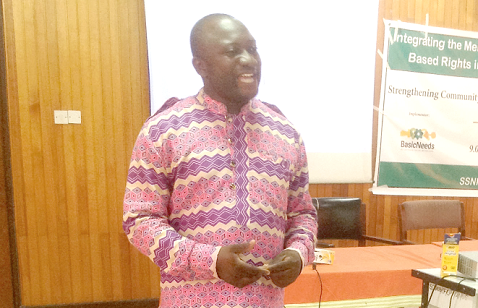
CSOs committed to addressing mental health challenges
Civil society organisations (CSOs) in the Upper East Region have indicated their commitment to source for funds and set aside resources to address mental health challenges among the vulnerable group in society.
They have also pledged to integrate mental health issues of women, children and the youth into their ongoing activities, as well as give maximum attention to issues concerning rights that are gender-based.
The measure, they said, had become necessary because it had been observed that women, children and the youth were the most vulnerable and the disadvantaged group in society, despite the fact that they formed the bulk of the country's workforce hence the need to harness their talents to improve on their economic well-being, as a step to enhance the socio-economic development of the country.
In this respect, BasicNeeds Ghana, a non-governmental organisation(NGO) with a focus on mental health, with support from the UK Department for International Development (DFID), launched a project in 2015, dubbed ‘Strengthening community mental health services to improve on issues of gender and youth and women’s mental health in Ghana’.
Deepen knowledge
Under this initiative, it was recognised that the CSOs needed a platform to help deepen their knowledge about mental health issues and integrate them into their respective activities as a way of addressing the mental health needs of the vulnerable group in society.
At a forum in Bolgatanga to create a platform for the CSOs to commit themselves to that agenda, representatives of the CSOs also observed that they needed to effectively collaborate with BasicNeeds, the Commission on Human Rights and Administrative Justice (CHRAJ) and the Domestic Violence and Victims Support Unit (DOVVSU) of the Ghana Police Service, to handle difficult cases of mental health, particularly among women and children, and also help create more awareness about mental health issues on every available platform in the course of running their activities.
The Upper East Regional Project Officer of BasicNeeds, Mr Bernard Azuure, indicated that a Regional Alliance for Mental Health and Development and a number of government’s decentralised ministries, departments and agencies (MDAs) have been reached out to and involved in interventions meant to increase mental health and community mental health care among women and the needy.
He said generally, there was inadequate mental health staff to deal effectively with mental health issues particularly among the vulnerable, and pointed out that attention to mental health issues within officialdom was still quite low, and added that reaching out to the destitute with mental illness with some occupational therapy services were some of the challenges facing BasicNeeds.
Staff strength
Mr Azuure mentioned that for instance, it was regrettable that only 12 psychiatrists were available nationwide instead of the required 80, and indicated that there were also only 700 psychiatric nurses although 4,000 were required nationwide.
He also said there were only three Clinical Psychologists instead of the 50 required in the whole country, with only 210 Community Psychiatric Nurses instead of 2,300 required nationwide, adding that presently, there were no Community Mental Health Officers for the whole country; 1,000 are needed.
Mr Azuure intimated that more than 45,000 traditional healers had been supporting the mental health needs of the people in the country.
The Head of the Mental Health Unit at the Bolgatanga Regional Hospital, Mr Victor Asangalisah, said although the exact causes of mental illness were not known, it was becoming clear through research that many of these conditions were caused by a combination of biological, psychological and environmental factors.
The Northern Regional Project Officer of BasicNeeds Ghana, Mr Kingsley Kumbelim, called on the CSOs to help adequately address mental health issues among women and children, by coming up with workable and practical solutions to the problem.
